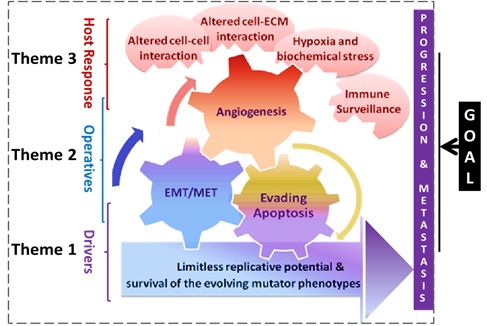Basic Science research
Tumor Biology and Microenvironment Research Program
Mission
Tumor metastasis is the predominant cause of cancer mortality and drug resistance. The goals of the Tumor Biology and Microenvironment (TBM) Program include identifying and exploiting the cellular and molecular determinants that drive and facilitate the interaction between tumor and its microenvironments, and developing and testing innovative diagnosis and treatment strategies to ultimately eradicate invasive and metastatic cancer. These goals are met within three themes which encompass a comprehensive scope of basic, preclinical and clinical research that provides the depth and flexibility of intra-programmatic collaborations, supports the institute-wide and multi-institutional team science initiatives and fosters the development of new strategic focuses. The first theme focuses on the identification of molecular, cellular determinants of invasive and metastatic tumors. Our investigators study novel mechanistic paradigms underlying the causative involvement of novel genetic, epigenetic, and signaling pathways in tumorigenecity, tumor phenotypical plasticity, and tumor drug response. Our investigators conduct translational research to evaluate the potential clinical application of these molecular determinants as tumor markers and/or therapeutic targets. The second theme is to identify and exploit the mechanisms that underlie the invasive behaviors at different steps of metastasis. Our members conduct multidisciplinary collaboration that identified an extracellular proteolysis/signaling network that enable tumor cells to adapt to and eventually overcome the varying microenvironments, especially at the site of bone metastasis. Key molecules in this network are currently tested as a signature to predict prostate cancer progression and treatment outcome. The third theme is to identify and exploit host immune response to tumor progression. In preclinical and clinical studies, our members explore the application of tumor vaccine and antibody-armed activated T-cells in treating several types of cancer, while our members continue to identify, evaluate and utilize adaptive cellular and humoral immune responses as novel therapeutic targets. Our investigators also study the role of mesenchyme and innate immune cells in tumor progression and therapeutic response. Emerging focus of our program includes novel organ-specific delivery strategy and B cells-based immunotherapy.
Scientific Themes

Program Leadership
 | Kay-Uwe Wagner, PhD |
Molecular Imaging Research Program
Mission
The goals of the Molecular Imaging (MI) Program include the development and testing of new imaging methods ranging from preclinical work on the synthesis of new probes and development of new devices to the clinical evaluation of imaging approaches to assess cancer risk, detect cancer, guide treatment and monitor therapy. These imaging methods are aimed at improving our understanding of cancer physiology and providing for the integration of these findings to ultimately improve the assessment of cancer and its treatment. To achieve these goals we have two themes.
Scientific Themes
- Theme 1. Synthesis and development of new methods to image tumor pathways and drug pharmacodynamics.
- Theme 2. Imaging diagnostics for risk assessment, detection, radiation targeting and response to therapy
Program Activities
The MI Program works to bring investigators together to expand collaborative activities with members of our program and other programs through:
- Monthly program meetings which include speakers from within the MI Program, speakers from related disciplines and invited outside speakers.
- Joint meetings or mini-retreats with other programs to highlight particular areas of collaboration.
- Yearly retreats are held for the program to further foster collaboration among members
- Organization of working groups to evaluate joint projects including multi-investigator pilot projects, protocols, and grants.
Program Leadership
 | Nerissa Viola, PhD |
Molecular Therapeutics Research Program
Mission
The underlying mission of the Molecular Therapeutics (MT) Program is to translate laboratory findings to the clinic so as to improve the lives of patients with cancer by identifying new molecules, targets and strategies for treating cancer. This highly interactive program includes a cross section of laboratory-based scientists and physicians at Karmanos who meet regularly through programmatic activities, and serve as co-investigators on research grants and investigator-initiated clinical trials.
The MT Program's over-riding goal is to integrate basic and translational scientists working broadly in areas of drug development, new or established therapeutic targets or pathways, and cellular and genetic biomarkers of cancer, with physicians conducting interventional treatment trials at KCI.
Scientific Themes
- Identify and validate novel therapeutics, targets and pathways for selective tumor targeting.
- Identify cellular/molecular determinants and biomarkers of tumor response.
- Validate clinical effectiveness of new agents in interventional treatment trials.
Program Activities
The MT Program leadership actively supports:
- Basic-clinical collaborations and translational research through the monthly program meetings
- Molecular Therapeutics Special Seminars
- Focused retreats
- Small working groups or topical conferences
- Clinical Translational Bridge Committee meetings to facilitate laboratory science into investigator initiated clinical trials
- An annual Molecular Therapeutics Program Retreat
- Targeted internal grants with emphasis on collaboration and translational science
Program Leadership
 | Asfar Azmi, PhD |